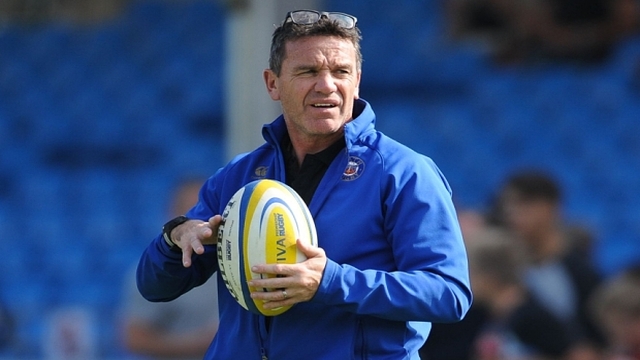Does success no longer guarantee job security?
Professional sport is primarily a results-driven business and elite coaches are painfully aware of the precarious nature of their chosen career.
But success does not always provide security- just ask former Manchester United manager Louis van Gaal whose recent FA Cup final win was greeted with boos from fans an then the sack as a result of a disappointing Premier League campaign.
Club rugby in England has traditionally not been so cut-throat with directors of rugby and head coaches normally allowed time to develop ideas and build teams even when results are not going their way.
But does Mike Ford’s recent departure from Bath just a year after steering his side to the Premiership final and winning the Director of Rugby of the Season honour signal a significant change in thinking among club owners?
Just 12 months ago praise was being heaped on Ford and his team for their exciting and crowd-pleasing approach to the game but a disappointing ninth place finish this term and failure to secure Champions Cup rugby next season prompted his exit.
Ford had been given time to bring his vision for the club to life having taken charge at the end of 2013 following the departure of director of rugby Gary Gold who he had previously served as head coach.
An appearance in the title-decider for the first time in 11 years would appear to illustrate progress but club owner Bruce Craig was clearly angered by a failure to build on that run and decided last month that Ford’s time had run out.
Craig took charge of the club in 2010 and has not been shy to wield the axe. Steve Meehan, Sir Ian McGeechan and Gold have all failed to provide an acceptable return for Craig’s sizeable investment in the club.
Ford was not helped this season by the demands placed on his leading players by the Rugby World Cup or the high-profile rugby league recruit Sam Burgess’ attempt and eventual failure to make his name in the 15-man code.
No doubt both, and injuries to key figures like Stuart Hooper and Dave Attwood, impacted on Bath’s worrying failure to reproduce the kind of rugby that had won them so many plaudits the season before.
Not even the presence of England stars Jonathan Joseph, Anthony Watson and George Ford could lift spirits or performance levels following their Six Nations triumph with the gloom having reportedly long-since descended in the changing room.
Traditionally the Premiership has not had a high turnover rate when it comes to head coaches or directors of rugby even since the birth of the professional era back in 1995.
The only other new directors of rugby set to grace the Premiership stage this coming season are Andy Robinson, who earned promotion from the Championship with Bristol, and John Kingston who moves up the ranks at Harlequins with Conor O’Shea having been appointed Italy’s new national coach.
Saracens boss Mark McCall joined the Premiership champions as head coach under Brendan Venter in 2010 before making the step up to director of rugby a little later that season.
Richard Cockerill moved into the coaching ranks at Leicester Tigers in 2005 before moving into the director of rugby role five years later and Jim Mallinder has been at Northampton’s helm since 2007.
Change is understandably more evident where success is not so common, for example at Gloucester where Bryan Redpath, Nigel Davies and David Humphreys have all had spells in charge since 2012.
But knee-jerk reactions to mediocrity are not that common. A prime example is the Newcastle Falcons where back-to-back-to-back 11th placed finishes have not cost Dean Richards his job.
Only relegation from the top flight and the inevitable cost-cutting process appears to curtail coaching careers.
In a trying economic world where Premiership clubs are not exactly rolling in huge profits it is perhaps surprising that more clubs do not opt for change in search of a better results, bigger crowds and larger bank balances.
In general, clubs are clearly prepared to give coaches time to produce those same results and also allow for a few bumps along the way. That is a huge plus for rugby union and those coaches trying to forge a career and a reputation in the sport.
But a line has to be drawn somewhere and the men with the money are well within their right to decide when enough is enough – they will agree that patience is a virtue but only to a point.
The Premiership has benefited from the deep pockets of certain individuals who have helped prop up the game since it turned professional and they are well within their right to demand a return.
In truth, the technical aspects of the game, the reliance on and importance of key combinations and the physical toll and inevitable injuries demand time to learn, nurture and manage respectively.
In addition, despite bumper TV rights deals there is perhaps not enough money at stake and therefore commercial pressure to warrant desperate measures in a quest for immediate results both on the field and financial – yet.
If the sport’s powerbrokers and investors get their way then the sport will become a more serious rival for football sooner rather than later at which point owners, fans and coaches will expect rapid results.
With that expectation will come the understanding that the feel-good factor after a major win will last no longer than the bubbles in the champagne.


